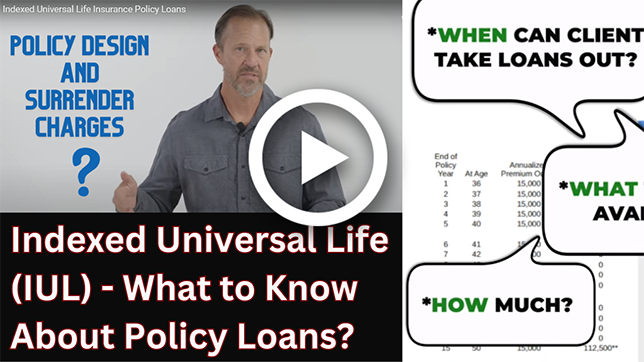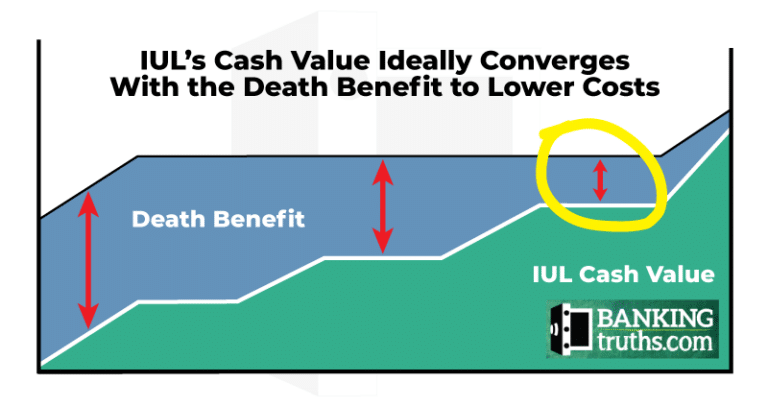All Categories
Featured
Table of Contents
1), usually in an effort to defeat their category averages. This is a straw male argument, and one IUL people love to make. Do they contrast the IUL to something like the Lead Overall Securities Market Fund Admiral Shares with no lots, a cost proportion (ER) of 5 basis factors, a turn over ratio of 4.3%, and an outstanding tax-efficient record of distributions? No, they compare it to some horrible proactively managed fund with an 8% tons, a 2% ER, an 80% turnover proportion, and a terrible record of temporary capital gain circulations.
Mutual funds frequently make annual taxed distributions to fund owners, even when the worth of their fund has actually decreased in value. Shared funds not only call for income coverage (and the resulting yearly taxes) when the shared fund is rising in worth, but can also impose income taxes in a year when the fund has decreased in value.
That's not just how shared funds work. You can tax-manage the fund, gathering losses and gains in order to decrease taxable distributions to the capitalists, yet that isn't somehow mosting likely to change the reported return of the fund. Just Bernie Madoff types can do that. IULs stay clear of myriad tax traps. The ownership of mutual funds might need the common fund owner to pay approximated tax obligations.
IULs are very easy to position to ensure that, at the proprietor's death, the beneficiary is not subject to either revenue or estate tax obligations. The very same tax decrease methods do not work virtually also with mutual funds. There are many, often costly, tax obligation traps linked with the moment purchasing and marketing of common fund shares, traps that do not relate to indexed life Insurance.
Chances aren't extremely high that you're going to go through the AMT as a result of your mutual fund distributions if you aren't without them. The remainder of this one is half-truths at ideal. For example, while it holds true that there is no earnings tax obligation because of your beneficiaries when they inherit the profits of your IUL policy, it is likewise real that there is no income tax as a result of your beneficiaries when they inherit a shared fund in a taxed account from you.
Net Payment Cost Index Life Insurance
There are better ways to stay clear of estate tax obligation concerns than getting investments with low returns. Mutual funds might cause earnings taxes of Social Protection advantages.

The growth within the IUL is tax-deferred and may be taken as tax obligation free revenue via finances. The plan owner (vs. the mutual fund manager) is in control of his or her reportable earnings, therefore enabling them to minimize or even get rid of the taxation of their Social Safety and security benefits. This set is fantastic.
Here's another very little concern. It holds true if you acquire a common fund for say $10 per share prior to the distribution date, and it disperses a $0.50 circulation, you are then going to owe tax obligations (most likely 7-10 cents per share) although that you have not yet had any gains.
In the end, it's actually about the after-tax return, not exactly how much you pay in taxes. You're also most likely going to have more cash after paying those taxes. The record-keeping requirements for possessing shared funds are dramatically much more complex.
With an IUL, one's documents are kept by the insurance provider, copies of yearly statements are sent by mail to the proprietor, and distributions (if any kind of) are amounted to and reported at year end. This is likewise sort of silly. Naturally you ought to maintain your tax obligation records in case of an audit.
Indexed Universal Life Insurance Vs Term
Rarely a reason to purchase life insurance policy. Mutual funds are generally component of a decedent's probated estate.
Furthermore, they undergo the hold-ups and costs of probate. The earnings of the IUL policy, on the other hand, is constantly a non-probate distribution that passes beyond probate directly to one's named recipients, and is consequently exempt to one's posthumous creditors, undesirable public disclosure, or comparable delays and expenses.
Medicaid incompetency and lifetime earnings. An IUL can offer their owners with a stream of earnings for their entire life time, no matter of exactly how long they live.

This is beneficial when organizing one's events, and transforming assets to earnings before a nursing home confinement. Mutual funds can not be transformed in a similar way, and are usually taken into consideration countable Medicaid possessions. This is one more stupid one promoting that poor individuals (you recognize, the ones who need Medicaid, a government program for the poor, to spend for their nursing home) ought to utilize IUL as opposed to common funds.
New York Universal Life Insurance
And life insurance policy looks terrible when compared relatively against a pension. Second, people who have money to get IUL over and beyond their retired life accounts are mosting likely to have to be horrible at taking care of cash in order to ever get approved for Medicaid to spend for their retirement home prices.
Persistent and terminal illness cyclist. All plans will certainly permit a proprietor's very easy accessibility to cash money from their plan, frequently forgoing any abandonment penalties when such individuals endure a severe illness, require at-home care, or come to be confined to a nursing home. Mutual funds do not offer a similar waiver when contingent deferred sales fees still put on a mutual fund account whose proprietor needs to market some shares to money the expenses of such a keep.
Universal Life Online
You get to pay more for that benefit (biker) with an insurance coverage policy. Indexed universal life insurance policy provides death benefits to the recipients of the IUL owners, and neither the proprietor nor the beneficiary can ever before shed cash due to a down market.
Now, ask yourself, do you actually require or want a fatality benefit? I absolutely don't require one after I reach monetary freedom. Do I desire one? I suppose if it were low-cost enough. Obviously, it isn't low-cost. Usually, a buyer of life insurance policy pays for real expense of the life insurance policy advantage, plus the prices of the policy, plus the profits of the insurance provider.
Iul Life Insurance Cost
I'm not totally sure why Mr. Morais threw in the entire "you can't shed cash" once more here as it was covered rather well in # 1. He simply desired to duplicate the very best marketing factor for these points I mean. Again, you don't shed nominal bucks, yet you can shed real dollars, along with face significant possibility price because of reduced returns.

An indexed global life insurance policy owner may trade their plan for a completely various policy without causing revenue taxes. A shared fund owner can stagnate funds from one shared fund firm to another without offering his shares at the former (thus setting off a taxed event), and buying brand-new shares at the latter, commonly based on sales charges at both.
While it is real that you can exchange one insurance coverage for an additional, the reason that people do this is that the very first one is such a dreadful policy that even after getting a new one and undergoing the early, unfavorable return years, you'll still come out in advance. If they were offered the best plan the very first time, they shouldn't have any need to ever trade it and experience the very early, adverse return years once more.
Latest Posts
Allianz Indexed Universal Life
Fixed Indexed Life Insurance
Principal Group Universal Life